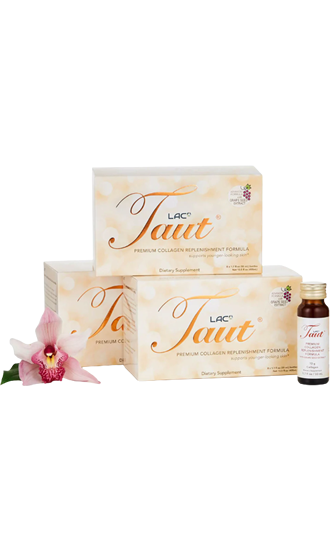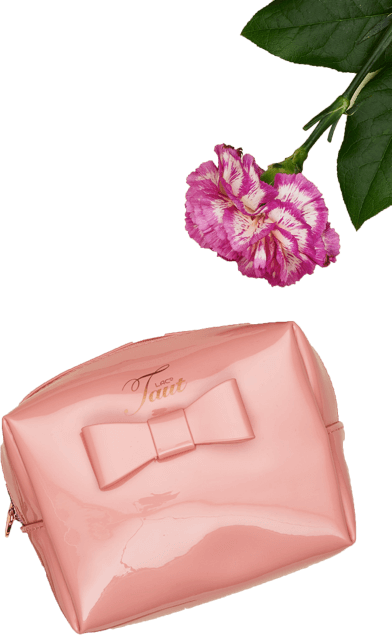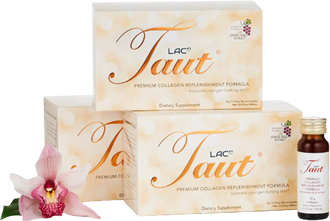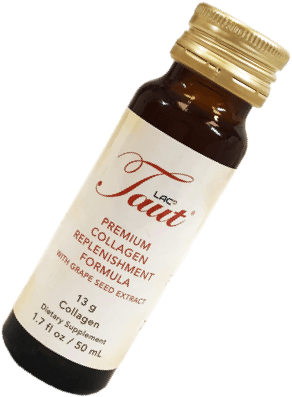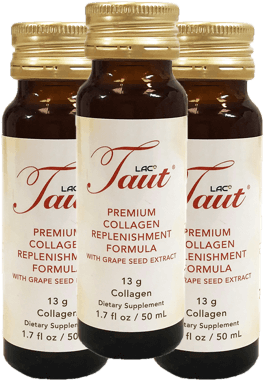Rosacea Treatment: Top 8 Treatments for the Nose & Face (How to Treat / Cure)
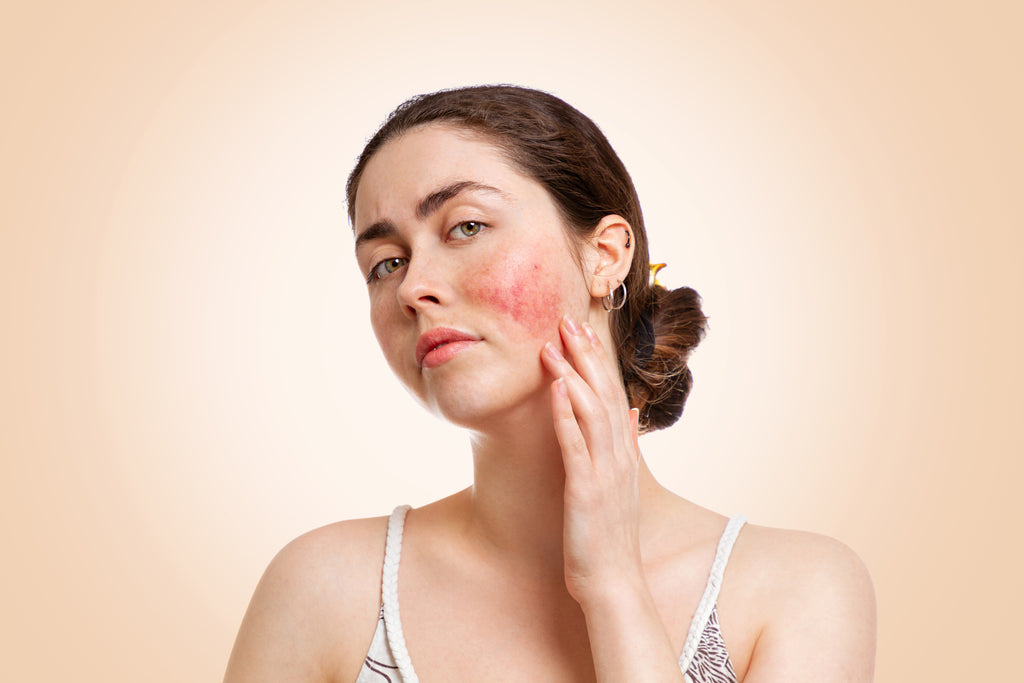
Rosacea is a chronic skin condition that causes redness, swelling, and uneven skin texture. It is also a very common condition, so if you are feeling its effects, you're not alone. According to the National Rosacea Society, rosacea affects 16 million Americans.1
Rosacea often knocks your confidence, as the symptoms can be uncomfortable, frustrating, and embarrassing. Whether you're in an important work meeting or heading out with friends, facial redness and inflammation are never welcome!
If you are beginning to notice any symptoms or have just received a diagnosis, you are probably wondering how to treat rosacea, and is there a cure? The bad news is, there is no cure for rosacea. However, it is possible to treat the symptoms with some serious skin care, good nutrition, up-to-date health information, and medication.
In this article, we will look into the root causes of rosacea, its signs and symptoms, and most importantly – the best treatment for rosacea.
What Causes Rosacea?
Rosacea can affect anyone. There is no one definite cause of rosacea, but there are a few factors that will influence your likelihood of developing the condition. Possible causes include:
- Genes – rosacea tends to run in the family!
- Your immune system may play a role in developing rosacea. Research has shown that most people with rosacea are especially reactive to a type of bacteria called bacillus oleronius.2
- Allergies – did you know that we all have a type of mites that live on our skin year-round? There could be a link between rosacea and an allergy to these specific mites.
- Gender – according to the Mayo Clinic, women are more likely than men to develop rosacea, but men with rosacea will suffer more severe symptoms.3
Once you have rosacea, flare-ups can be caused by any of the following triggers:
- Alcohol & spicy food
- Sunlight & harsh weather conditions
- Strong emotions
- Exercise
- Harsh skincare products
Looking for skincare that reduces redness? RenewskinCo can help with that.
Signs and Symptoms of Rosacea
Rosacea symptoms can be uncomfortable, and they tend to worsen over time if not treated properly. Let's take a look at the clinical signs and symptoms of rosacea:
1. Facial Redness
The most common first sign of rosacea is a persistent redness of facial skin, particularly around the nose and cheeks.
This looks similar to blushing or sunburn, and it is often accompanied by a warm sensation on your face. This redness happens when blood rushes to the skin and your blood vessels enlarge to handle the excess blood flow.
More helpful reading: maskne
2. Visible Blood Vessels (Telangiectasias)
At a later stage of rosacea, continued flushing can cause your blood vessels to expand and show through your skin. These dilated blood vessels appear as red lines on the face, particularly around the cheeks.
3. Lumps & Swelling
It is common for rosacea-sufferers to notice red lumps appearing on the face. These can be solid papules or pus-filled pimples which may resemble acne. Rosacea is sometimes nicknamed "adult acne" for this reason.4
Rosacea is also often characterized by a thickening of the skin, particularly around the nose. Oil glands become enlarged and cause the tissue across the nose and over the cheeks to build up, often causing a bulbous nose. This symptom is known as rhinophyma, and it is more common in men than in women.
4. Stinging & Burning
In some cases, people with rosacea may feel a stinging or burning sensation on their face, particularly during a bad flare-up. The skin could also feel tight, itchy, and dry.
5. Eye Irritation
Eye irritation affects approximately 50% of people with rosacea, and it can be characterized as a separate set of symptoms referred to as ocular rosacea.5
This can manifest as swelling around the eyes, visible blood vessels on eyelids, and dry, stinging eyes. In rare severe cases, ocular rosacea can cause vision impairment.
More helpful reading: Can I use hyaluronic acid with retinol?
Top 8 Skin Care Tips To Treat Rosacea
According to the American Academy of Dermatology, there is no cure for rosacea, only management of the symptoms. Thankfully there are ways to minimize the effects of rosacea on your face.6
Here are our top 8 tips to help you build a treatment plan that works for you.
1. Sun Protection
Make sure you are wearing adequate sun protection 24/7. People with rosacea are very susceptible to sun damage, and sunburn will only worsen your existing symptoms. Not to mention the other serious health risks associated with sun exposure!
Make sure you wear a broad-spectrum sunscreen of SPF 30 or higher every day to protect your skin from further redness and irritation. A broad-spectrum, mineral sunscreen is the best form of sun protection for people who suffer from rosacea.
More helpful reading:
https://www.renewskinco.com/blogs/i/how-to-repair-sun-damaged-skin-collagen-and-antioxidants
2. Use Gentle & Moisturizing Skin Care Products
Harsh chemicals are among the many triggers of rosacea flare-ups, so we recommend you stick to mild and non-abrasive skin care products.
To combat red, dry, and stinging skin, try to find a gentle hydrating product that can keep your skin supple and smooth. Well-hydrated skin will bounce back more easily from flare-ups.
This is where Taut Hydrate can help. Our premium hyaluronic acid supplement is the perfect way to hydrate your skin from the inside out, with minimal risk of irritation to your dermis.
Made with 99% pure hyaluronic acid and grape seed extract, this formula works for your face and body to hydrate your skin, improve firmness and smoothness, and visibly reduce signs of skin imperfections.
More helpful reading on skin care ingredients to avoid.
3. Avoid Spicy Food & Alcohol
Two big triggers for rosacea are spicy foods and alcoholic drinks as they both inflame the skin, so try to stay away from these as much as possible. Many people find an anti-inflammatory diet helpful in managing redness and irritation.
More helpful reading:
https://www.renewskinco.com/blogs/i/is-alcohol-bad-for-your-skin
4. Avoid Extreme Temperatures
Extreme hot or cold weather triggers this skin condition and can exacerbate rosacea symptoms, so try to avoid going out in extreme weather conditions. Hot water in the shower or the bath can also cause flare-ups of redness and irritation, so aim to stick to lukewarm water.
5. Use Antioxidants
Antioxidants can minimize inflammation, repair skin damage, reduce redness, and even your skin tone. Examples of antioxidants include glutathione, vitamin C, vitamin A, and grape seed extract. These can all help with the management of rosacea.
Try to incorporate antioxidants both in your diet and in your skin care routine for maximum benefits. Eat plenty of colorful fruits and vegetables for an antioxidant-rich diet, and look for antioxidants in skin care products like serums and moisturizers.
More helpful reading: ceramides
Boost Your Antioxidant Supply With Taut Bright
Try a skin-loving supplement like Taut Bright, which contains 7 powerful antioxidants and active ingredients proven to fade hyperpigmentation and repair cellular damage caused by free radicals.
This supplement combines glutathione, L-cystein, olive leaf extract, artichoke leaf extract, grape seed extract, alpha-lipoic acid, and vitamin C to provide antioxidant benefits for your face and your body.
Try Taut Bright today to reduce redness and feel more confident in your skin!
More helpful reading:
https://www.renewskinco.com/blogs/i/9-superfoods-for-glowing-healthy-skin
6. Try Medication
If you suspect you have rosacea, visit your doctor or a board-certified dermatologist for a clinical assessment of your symptoms. Your doctor or dermatologist will be able to give you a diagnosis, medical advice, and discuss your treatment options.
According to the American Academy of Dermatology, there is no simple diagnosis procedure for rosacea. It is diagnosed by your doctor or dermatologist if you are displaying the main symptoms like facial redness and irritation, once other skin health conditions like lupus or allergies are ruled out.
Many of the most effective treatments for rosacea are prescribed by a doctor or dermatologist. The top medications for rosacea include:
- Topical creams such as brimonidine or oxymetazoline, which restrict blood vessels on the skin to reduce redness
- Azelaic acid to exfoliate and help reduce pimples
- Oral antibiotics to combat eye irritation, fight bacteria on the skin and reduce redness and pimples
- Oral acne medication to treat bumps and pimples
More helpful reading: types of skin
7. Laser Treatment
Laser treatment and other topical light-based therapies can be particularly effective in treating visible blood vessels and the redness that comes with them. You can access these types of treatment through a dermatologist.
If you are suffering from rhinophyma, your doctor or dermatologist may also suggest a rosacea nose treatment. This involves removing excess tissue with laser treatment or light therapy.
Rosacea patients with acne-like symptoms can also benefit from light-based therapy, which also works to minimize pustules and papules.
The downside to laser and light-based therapies is that they can be expensive, costing hundreds of dollars per treatment and with each patient usually needing 2–5 treatments with a dermatologist to achieve the desired results.
More helpful reading:
8. Try Collagen Supplements
If you want to reduce redness and inflammation while also boosting your skin's elasticity, collagen supplements could be just what you're looking for!
Your skin's structure is made up of the fibrous proteins collagen and elastin, which are responsible for keeping your complexion supple and taut. As we age, our collagen and elastin supplies deteriorate and our skin begins to sag and wrinkle as a result.
A 2021 study by the Johns Hopkins School of Medicine links rosacea to accelerated collagen degeneration, meaning that people who suffer from rosacea are more likely to suffer from premature skin aging.7
A collagen supplement can help you to replenish your body's collagen supplies and protect your skin from harm.
Transform Your Skin In Just 24 Days With Taut Liquid Collagen
Our Taut Premium Collagen Drink combines 13,000mg of marine collagen peptides with hyaluronic acid, elastin, vitamin C, and ceramide to supercharge your skin's collagen production and help you achieve a radiant glow.
The Taut Collagen Intense Transformation Program is one of our best and most effective skin care systems, which offers a 24-day supply of this Premium Collagen Drink.
Just one drink per day can restore your skin's collagen and help you to visibly reduce the appearance of fine lines and wrinkles, minimize facial redness and inflammation, and deliver a glowing, youthful complexion.
Once you have finished the program, we recommend that you continue to take our collagen drink every other night to maintain your results. Luckily, our products are available on a subscription basis so you can always have your skin saviors at the ready!
References:
- https://www.rosacea.org/patients/all-about-rosacea
- https://www.aad.org/public/diseases/rosacea/what-is/causes
- https://www.chicagotribune.com/lifestyles/health/sns-201907231506--tms--premhnstr--k-a20190724-20190724-story.html
- https://www.health.harvard.edu/a_to_z/rosacea-a-to-z
- https://www.healthline.com/health/ocular-rosacea
- https://www.aad.org/public/diseases/rosacea/treatment/diagnosis-treat
- https://www.dermatologytimes.com/view/collagen-degeneration-linked-to-rosacea




